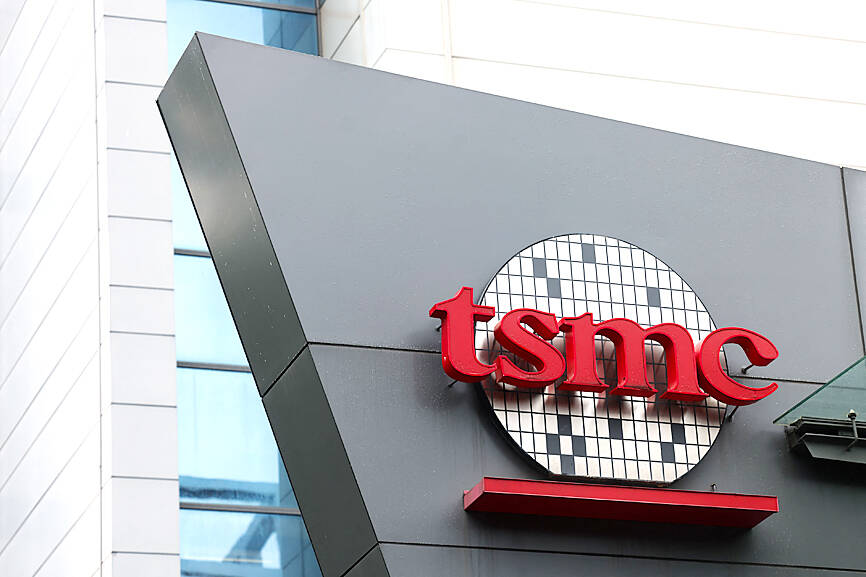Taiwan Semiconductor Manufacturing Co (TSMC, 台積電) shares reached a record high on Monday in New York trading, as the world’s largest contract chipmaker is poised to cap its best annual stock performance in 25 years.
The stock climbed as much as 1.4 percent in Taipei yesterday, briefly surpassing its Nov. 8 peak, before erasing the gain to end flat at NT$1,080.
The move came after US chip stocks, including key customer Nvidia Corp, rallied on Monday. TSMC shares are up 82 percent this year amid continued investor enthusiasm for artificial intelligence (AI) trades.

Photo: I-hwa Cheng, AFP
“For us, TSMC remains the best way to play the AI theme without having to pick a winner or a technology, at a reasonable valuation,” said Kevin Net, head of Asian equities at Financiere de l’Echiquier.
The next catalyst to watch would be Nvidia’s presentation at Consumer Electronics Show next month as well as TSMC’s upcoming results and guidance, he added.
With a client list including Apple Inc and Advanced Micro Devices Inc, TSMC has been a major beneficiary of the boom in AI spending. The company is expected to report sales growth of 36 percent for the last quarter of the year, with a gross margin at 58.3 percent, the highest since 2022.
Unlike TSMC, which dominates the high-end chip market, companies specializing in mature IC processes saw strong buying interest yesterday in Taipei, after the US President Joe Biden administration on Monday launched a trade probe into Chinese-made “legacy” semiconductors, with United Microelectronics Corp (聯電), Taiwan’s second-largest contract chipmaker, rising 4.05 percent to close at NT$36.
Additional reporting by CNA

SEEKING CLARITY: Washington should not adopt measures that create uncertainties for ‘existing semiconductor investments,’ TSMC said referring to its US$165 billion in the US Taiwan Semiconductor Manufacturing Co (TSMC, 台積電) told the US that any future tariffs on Taiwanese semiconductors could reduce demand for chips and derail its pledge to increase its investment in Arizona. “New import restrictions could jeopardize current US leadership in the competitive technology industry and create uncertainties for many committed semiconductor capital projects in the US, including TSMC Arizona’s significant investment plan in Phoenix,” the chipmaker wrote in a letter to the US Department of Commerce. TSMC issued the warning in response to a solicitation for comments by the department on a possible tariff on semiconductor imports by US President Donald Trump’s

‘FAILED EXPORT CONTROLS’: Jensen Huang said that Washington should maximize the speed of AI diffusion, because not doing so would give competitors an advantage Nvidia Corp cofounder and chief executive officer Jensen Huang (黃仁勳) yesterday criticized the US government’s restrictions on exports of artificial intelligence (AI) chips to China, saying that the policy was a failure and would only spur China to accelerate AI development. The export controls gave China the spirit, motivation and government support to accelerate AI development, Huang told reporters at the Computex trade show in Taipei. The competition in China is already intense, given its strong software capabilities, extensive technology ecosystems and work efficiency, he said. “All in all, the export controls were a failure. The facts would suggest it,” he said. “The US

The government has launched a three-pronged strategy to attract local and international talent, aiming to position Taiwan as a new global hub following Nvidia Corp’s announcement that it has chosen Taipei as the site of its Taiwan headquarters. Nvidia cofounder and CEO Jensen Huang (黃仁勳) on Monday last week announced during his keynote speech at the Computex trade show in Taipei that the Nvidia Constellation, the company’s planned Taiwan headquarters, would be located in the Beitou-Shilin Technology Park (北投士林科技園區) in Taipei. Huang’s decision to establish a base in Taiwan is “primarily due to Taiwan’s talent pool and its strength in the semiconductor

French President Emmanuel Macron has expressed gratitude to Hon Hai Precision Industry Co (鴻海精密) for its plan to invest approximately 250 million euros (US$278 million) in a joint venture in France focused on the semiconductor and space industries. On his official X account on Tuesday, Macron thanked Hon Hai, also known globally as Foxconn Technology Group (富士康科技集團), for its investment projects announced at Choose France, a flagship economic summit held on Monday to attract foreign investment. In the post, Macron included a GIF displaying the national flag of the Republic of China (Taiwan), as he did for other foreign investors, including China-based